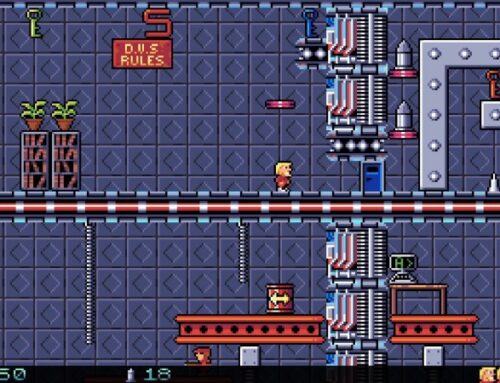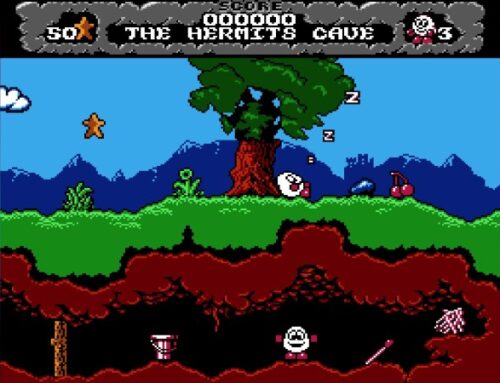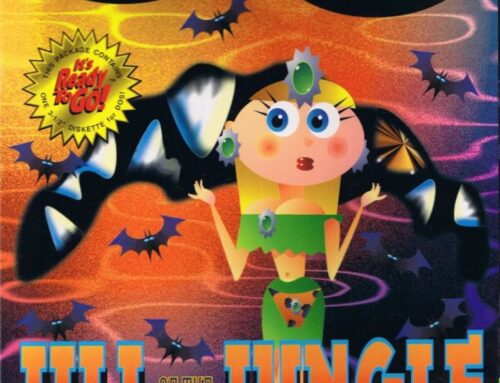Time is ticking away as I type this — 2022 is on the way. In fact, in some parts of the world, it’s already here! Doubtless many of you are frantically thinking of a new year’s resolution that you can commit to for the first three days of the new year, then conveniently ignore for the rest of the year — so we’ve got a few suggestions for you. Best of all, our resolutions are retro gaming resolutions that you might actually be able to keep!
Because this is the Internet and it’s necessary to mention such things even when they’re spectacularly obvious, I should probably add that none of these are suggestions intended to be taken too seriously, nor are they intended to things that we wish to imply that everyone must do. But they should make up some fun challenges for you to take on — particularly if you’re looking to explore the retro gaming hobby in a different way, or in more detail than ever before!
So let’s get into it: here we have five retro gaming resolutions to take on in 2021.
Play more games you’ve never heard of

When exploring retro gaming, the temptation is to explore the big names: the Marios, the Zeldas, the Sonics and the Metroids. And while there’s plenty of value to be had from playing these well-known titles — particularly if you’ve never explored them before — I can say with some honesty that the most enjoyable times I’ve had with retro gaming in recent years have come from when I picked up a game for 50p from CEX with no idea what it was, and just gave it a go. So a great retro gaming resolution is to take a chance like this.
Every generation of gaming is absolutely full of games that never got the time of day in magazines back when they were current, and which don’t even get explored all that much by modern retro gaming writers, YouTubers and streamers. Some of those titles have remained obscure with good reason, of course — hell, the Atari 2600’s saturation of crap games nearly killed the video game industry in the early ’80s — but there are just as many, particularly from later generations, that are eminently worthy of your time.
Got a PS2? Take some time to explore the Simple Series, home of low-budget games by highly creative Japanese developers. Got an OG Xbox? Dig up some of the platform exclusives that are not — and, at this point, never will be — part of the backwards compatibility program. Got a Game Boy? Play pretty much anything.
My personal approach to this is just to pretty much take a “lucky dip” into places like CEX, dig up some cheap stuff that looks vaguely interesting and take a chance on it. While I’ve encountered a few duffers along the way by doing this, I’ve also acquired some real, honest-to-goodness favourites for my library.
An alternative approach is to take a look at collections that have been curated for you. The Evercade library is a good example — each cartridge available for the platform contains a selection of games that include both well-known and well-regarded titles as well as some more obscure, lesser-known games. And you might be surprised how often some of those lesser-known games will become longstanding favourites!
In some cases, entire carts, such as the Piko Collection 1 and Piko Collection 2, Indie Heroes, Mega Cat Studios 1 and Mega Cat Studios 2 collections, are dedicated specifically to either more obscure titles from the past or brand new games for classic platforms.
Playing more stuff you’ve never heard of means that you will end up with more interesting things to share with others, too — so take a risk and try an oddball game today!
Step out of your genre comfort zone

We all develop certain preferences and specialisms over time, and part of that process often involves starting to feel an aversion from the things that don’t fit those preferences. When it comes to gaming, that sometimes means eschewing popular or well-regarded games from genres that are outside our comfort zone — but if you deliberately step out of that comfort zone now and then, you might be surprised to discover some new favourites.
Sports games are a great example — though not the only example, by any means. As our occasional Sports Games Don’t Suck column here on Retrounite has hopefully demonstrated, there are plenty of sports games that remain well worth playing today. And with the disdain most collectors hold for sports games, you can generally pick them up really cheap, too.
Of course, you don’t have to pick an oft-overlooked genre to fulfil this retro gaming resolution — you simply have to play something you wouldn’t normally try. Shoot ’em up fan? Try a puzzle game. Adventure game enthusiast? Give an RPG a go. Action gamer? Try your hand at real-time strategy. The possibilities are endless — and while you may well simply find yourself confirming your own preferences, there’s a pretty good chance you might inadvertently come across a new favourite, too. You’ll never know until you try!
Play a “bad” game

For years, you’ve avoided a particular game despite thinking that it looked kind of cool, because a magazine you read once back in the early ’90s gave it 45% and said it was a festering pile of dog poo. 30 years later, you stumble across a copy of it for three quid at a car boot sale and decide to try it for yourself, only to discover a game that you would have absolutely adored back in the day — and are now kicking yourself for not trying earlier.
Reading reviews and watching videos about games can be a good way of learning about what is available to you — but a great retro gaming resolution is to ignore the “opinion” side of the equation completely and just try something that you think looks appealing, regardless of what popular perception of the game in question might be. This is true not just for retro games, but for modern games, too — there is such a diverse range of experiences out there that everyone will find something to love, even if other people hate it.
It’s relatively rare that a game is so irredeemably awful that no-one can get any value out of it whatsoever — so if you think you might like something that has been torn to shreds in reviews over the years, try it for yourself! And if you end up really liking it? Well, today’s Internet makes it easier than ever before to share your own thoughts on it via writing, podcasting or videos. So do your bit to set the record straight, and help remind everyone that it is indeed possible for there to be more than one opinion in existence about the same thing at once — something easily forgotten these days.
Explore a new system

Much as with game genres, we all tend to develop our own preferences for systems over the years, and in many cases focus our attention on one or two specific platforms that we particularly resonate with. That’s no bad thing — in the case of the most popular platforms, just one complete library is more than enough game to keep you busy for years — but a great retro gaming resolution is to explore platforms other than those that you’re most familiar with.
You can take a number of different approaches with this, too. You can explore the contemporaries of the platforms you’re most familiar — so, say, if you’re a Mega Drive fan, you might want to check out the PC Engine. Alternatively, you can explore the platforms that came long before or after your favourite platforms — so if you’re typically a fan of gaming from the 3D era onwards, look back at consoles where sprites were the norm. Or you can even investigate systems that either didn’t endure as long as their peers — check out the Intellivision and ColecoVision in comparison to the Atari 2600, for example — or that were doomed from the outset, such as anything Atari released post-2600.
You don’t even need to commit to an expensive collection to simply explore a new system’s library in many cases. Emulation is easily accessible for all, and in many cases the software for really old systems has been released into the public domain or at least archived on the Internet Archive for all to investigate. And then, of course, we come back to initiatives like the Evercade, which celebrates lesser-known platforms in an officially licensed manner through cartridges such as the Intellvision Collection 1, and Atari Flashback Classics bringing a selection of Atari 5200 games back from the dead for the first time in nearly 40 years.
Remember it’s okay to enjoy games just for yourself

These days, it’s increasingly common for people to get drawn into the hype surrounding relatively new media such as streaming, and to feel a need to monetise your hobby for it to be somehow “worthwhile”. In other words, you end up picking out things for your collection purely because you think they’d make good stream fodder, or a good subject for a “WORST NES GAMES EVER??!!” YouTube video.
While it can be fun to share your experiences with others and even end up profitable if you manage to strike it lucky — and make no mistake, luck is a big part of it all — it’s important to remember that at heart, it’s still just a hobby. And in the years before the Internet, we were more than happy to enjoy our hobbies just for ourselves, without feeling the need to share every little moment of them with the rest of the world in the hope someone might be listening — or, worse, only doing things that could potentially score us some cash, rather than for the sake of enjoyment.
A great retro gaming resolution is to now and then just set aside some gaming time for yourself and no-one else. Sit down in front of a console, pick a favourite game — even one you’ve played to death previously — and just enjoy yourself with no distractions. Turn your phone off, stay off all forms of social media, shut the curtains, have snacks and drinks within arm’s reach, and just play the damn game. No need to make snarky comments to an audience, no need to overanalyse everything the game is doing, no need to justify what you’re doing to anyone. Just enjoy yourself, quietly and peacefully, and remember what doing something just for fun is like.
This last one? This is one I personally am going to make a point of doing more in the new year. Because sometimes all that matters is that what you’re doing makes you happy — and heaven knows after the last couple of years we’ve had, we could all do with a bit of unconditional happiness.




